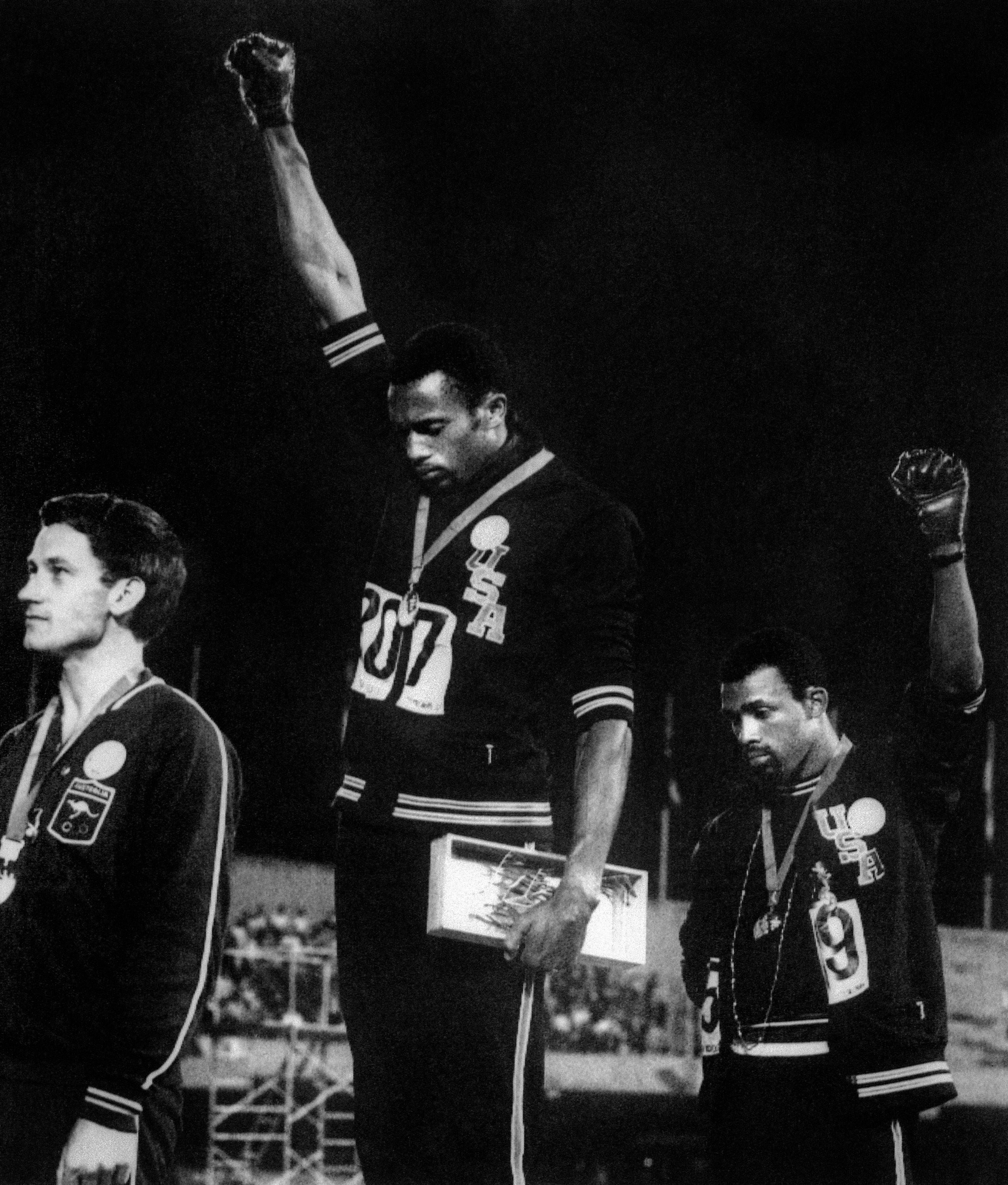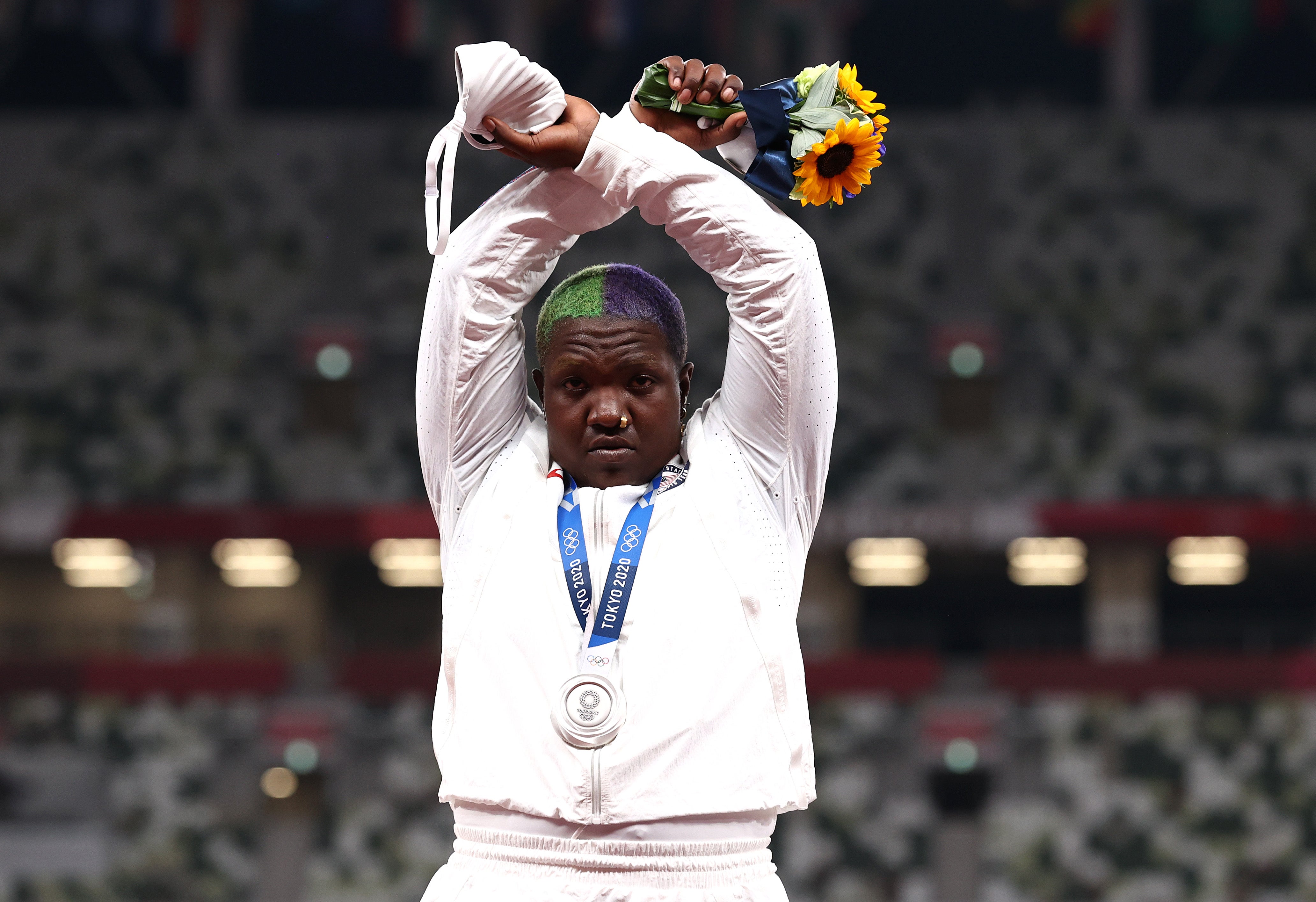Your support helps us to tell the story
From reproductive rights to climate change to Big Tech, The Independent is on the ground when the story is developing. Whether it's investigating the financials of Elon Musk's pro-Trump PAC or producing our latest documentary, 'The A Word', which shines a light on the American women fighting for reproductive rights, we know how important it is to parse out the facts from the messaging.
At such a critical moment in US history, we need reporters on the ground. Your donation allows us to keep sending journalists to speak to both sides of the story.
The Independent is trusted by Americans across the entire political spectrum. And unlike many other quality news outlets, we choose not to lock Americans out of our reporting and analysis with paywalls. We believe quality journalism should be available to everyone, paid for by those who can afford it.
Your support makes all the difference.Silver medalist Raven Saunders made a statement at the Tokyo 2020 Olympics on Sunday after she raised her arms above her head and made an “X” gesture on the winner’s podium.
The 25-year-old US shot putter, who came second at her event, explained afterwards that the gesture was meant to represent “the intersection of where all people who are oppressed meet”.
Political statements during competition or on the winners podium have been banned by the International Olympic Committee (IOC), although the rule has been partially relaxed this year to permit peaceful protest prior to competition - including taking the knee.
Competitors are still discouraged from making any gesture, symbol or action that “targeted, directly or indirectly, against people, countries, organisations and/or their dignity”.
But athletes have been known to take a stand at the winner’s podium at the Olympics before. Here are the Olympic medalists who have staged protests in the past.
Tommie Smith and John Carlos

The Black Power salute made by athletes Tommie Smith and John Carlos during the 1968 games in Mexico City was widely regarded as one of the most overtly political statements in the history of the modern Olympics.
Smith and Carlos had both won gold and bronze medals respectively in the men’s 200-metre running event on 17 October. They made the gesture on the podium while facing the US flag and kept their hands raised until the US national anthem finished.
The crowd booed the athletes as they left the podium. Smith later said: “If I win, I am American, not a black American. But if I did something bad, then they would say I am a N*****. We are black and we are proud of being black. Black America will understand what we did tonight.”
Vera Čáslavská

Czechoslovakian gymnast Vera Čáslavská also protested during the 1968 Olympics.
The seven-time Olympic gold medallist was known for her outspoken support of the Czechoslovak democratisation movement and publicly opposed the Soviet-led invasion of her home country.
Čáslavská spent the weeks leading up to the games hiding in the mountain town of Šumperk to avoid being arrested as a result of her opposition. She was granted permission to travel to Mexico City to compete as the last minute.
She appeared to have won the gold medal on the floor outright, but the judging panel chose to upgrade the preliminary scores of Soviety gymnast Larisa Petrik. A tie for the gold was declared.
In protest, Čáslavská quietly turned her head down and away during the playing of the Soviet national anthem. Her gesture was celebrated by the Czech people, but according to the New York Times, she was effectively forced into retirement following the games and considered a persona non grata for many years in her home country.
Pakistan field hockey players
At the 1972 Summer Olympics in Munich, 11 Pakistani field hockey players were banned from Olympic competition for life by the IOC after they protested the outcome of the final against West Germany.
During the medals ceremony, some of the players turned their backs to the West German flag. The IOC charged the players with being disrespectful at the final awards ceremony, at which Pakistan was awarded the silver medal.
Ibragim Samadov
Russian weightlifter Ibragim Samadov did not accept the Olympic bronze medal at the 1992 Olympics in Barcelona. He refused to lean forward to accept it on the podium, and after taking the medal in his hand, he dropped it on the floor and walked away.
The athlete, who had been a gold medallist at the 1991 World Weightlifting Championships, was unhappy as he had finished third on a technicality. Samadov weighed one-tenth of a pound more than his competitors, which was seen as an advantage.
Samadov was stripped of his bronze medal and banned for life from the games. He apologised the following day, but the IOC did not accept it. Dr Tamas Ajan, general secretary of the International Weightlifting Federation, said Samadov had failed to respect the IOC, as well as “the spirit of the games, his colleagues, the anthems, the flags”.
Ara Abrahamian

Armenian-Swedish wrestler Ara Abrahamian also rejected the bronze medal at the 2008 Sumer Olympics because of a controversial ruling in the semi-final. His Swedish coach Leo Mylläri disputed the judges’ ruling.
He protested by immediately removing the medal after it was placed around his neck, placing it in the centre of the mat, and walking away. He later declared he was retiring from the sport.
Following a “disciplinary hearing” after the incident, the IOC disqualified the athlete and banned him from the games due to “violating the spirit of fair play”. He did not apologise to the IOC.

Join our commenting forum
Join thought-provoking conversations, follow other Independent readers and see their replies
0Comments